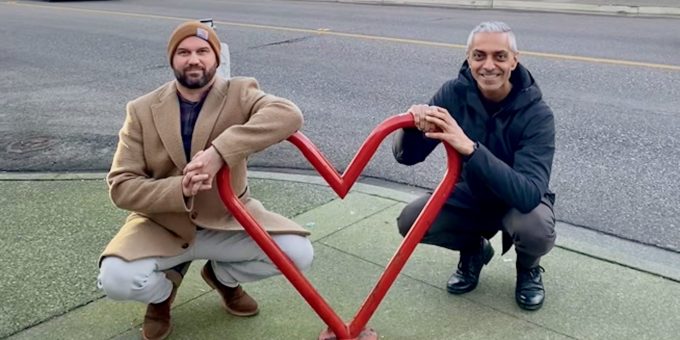
Feeling the love. Photo by Fernando Garcia.
letter from the editors: winter 2025
And so begins our end.
With this issue we step forward into the final year of our editorship of Contexts, embodying in a personal way the theme of “heartbreak and hope” that animates these pages. We recognize that our letter finds you at a time when fear and fury, shock and struggle saturate our lives, but the features and photos we present reflect what makes us human: the search for something good—despite the devastations. In the words of Shel Silverstein: “Listen to the mustn’ts, child. Listen to the don’ts. Listen to the shouldn’ts, the impossibles, the won’ts. Listen to the never haves, then listen close to me…. Anything can happen, child. Anything can be.”
Here, you’ll find layer after layer of something special. For instance, in past years, we focused our Q&A on conversations with journalists and public intellectuals about how they use social science research in their work. But this year, we’re doing something different by spotlighting all the former editors of Contexts, exploring how they sought to realize what founding editor, Claude Fischer—whom we interviewed first—characterized as the sine qua non of our beloved magazine: a “moral obligation” that we, as sociologists, have to share our knowledge with the wider public, “to deliver something useful, accessible, and interesting” to them. You’ll glean rare insights into the undertaking of this grand project of public sociology, embodied in these pages.
Individual behavior is contextual, Fischer told us. Contexts matter. That insight is truer than ever. And so, we invited five sociologists to share their reflections about the 2024 U.S. presidential election. Just as the discipline is a “big tent,” the esteemed essayists in this special section offer many viewpoints into the why, how, and especially the now what questions that we are all asking, questions that take aim at our collective heartbreak and hope.
The delicate dance between reality and potentiality glides through the entire issue, including in all of our outstanding feature essays. The first focuses on the sea of grief that envelops high schools whose students experience gun violence. The burden that survivors carry often falls to the wayside as the media and school officials rush to move on—but we must mobilize our material and emotional resources as a salve for the inner lives and academic futures of our students. A second essay, examining why men cheat on their wives, reveals that counter to popular narratives about sexual desires, at least some men actually seek greater emotional connections. Critically, we see both the downsides to this finding—many men have unreasonable emotional expectations for their partners—and the positives: men are not uniformly cold and calculating but in fact yearn for more meaning. The same duality presents in our book review, which contrasts the academic’s “commonsense” and distant take on people with an empathic experience we uniquely can access by paying attention to the lives being lived by those same people. Reader, we encourage you to feel more and get closer—as our authors do—to groups like unhoused people, the mentally ill, and aging gang members, all of whom you will meet in this issue.
The perils of uncertainty and change run alongside heartbreak and hope in a third feature, where we see businesses struggling with competing goals of sustainability and profitability. Becoming a green business sounds good, right? But what happens when environmental goals brush up against the bottom line? Our final feature considers how Gen Z women are rejecting the binds of hashtag feminism, yet without accessing the wealth of global feminisms that might truly prove utopic and liberatory (they might look, for instance, to the Black women in Sharla Berry’s culture review who, finding that work is a zero-sum game, have decided to stop playing).
From one page to the next is also the specter of technology: in a culture essay on the philosophical, ethical, and practical dilemmas AI poses for sustaining a social self and in Allison Pugh’s One Thing I Know piece, which asks what price we pay when we shift burdens of care from humans to computers.
With new endings and new beginnings, the world never stops changing. That can be stressful and painful, but from it can spring forth so many good things. Whether, as in our evocative photo essays and trends pieces this issue, we step into that more generative space by crossing boundaries and blazing paths or, as in our special election reflections, by bringing our knowledge to bear on pressing social problems, we believe this first issue of the year illuminates an irrevocable insight: agency, like the contexts in which we live our lives, matters—and it provides an inextinguishable spark of hope amid the sting of heartbreak.
Seth Abrutyn and Amin Ghaziani
